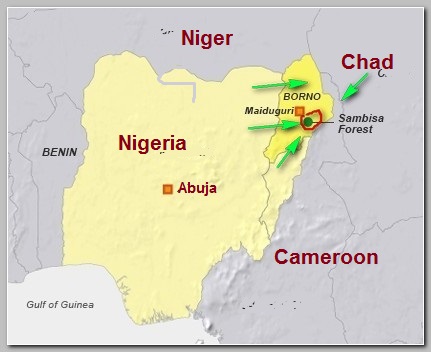Propaganda War Escalates Between the Nigerian Military and Boko Haram

Brigadier-General Sani Usman of the Nigerian military
The test of strength between Boko Haram and the Nigerian military has now shifted to the arena of propaganda. In obvious belief in the strategic wisdom promoted by thinkers who say that “a lost battle is a battle one thinks one has lost”, Boko Haram is staging a counter-narrative of the capture of Sambisa fortress as meaning its demise.
The military declared the war as basically over once Sambisa forest fell. The president personally made this announcement, indicating the weight of that victory in national security sense. Nigerians took the news cheerfully with kudos flying in the direction of the president and the military on that. But just before the clinking of glasses could begin, Boko Haram came up with a video to claim that it remains a force. Displaying the usual taunting antics, Shekau said in the video that he and his fellow terrorists were safe and had not been flushed out of the forest. He also gave indications that no tactics and strategies could locate them unless Allah decreed it. He then went on to advice the government against telling lies as if he himself was above telling lies. For, the inference about their invincibility to tactics and strategies suggests that they are not in the forest as Shekau claimed. Perhaps, terrorism itself is about lying.
Anyway, before nightfall yesterday, the military fired back, saying it is not worth anybody’s time believing the message of the video. Brig.-Gen. Sani Usman who spoke for the military said they would like to reassure the public that this video was nothing but “mere terrorists propaganda aimed at creating fear in the mind of people” and make Boko Haram to remain relevant. There is no cause for alarm, he said, adding that more concerted efforts in clearing the vestiges of Boko Haram terrorists wherever they might be hiding was already ongoing. It was like saying, we stand by our narrative of the war this far.
The war has thus entered a new and critical phase as far as contemporary warfare is concerned. Contemporary warfare is not necessarily won by combat but by propaganda because the mind of the populace is a major feature of total wars which is what all wars today are. Secondly, terrorism itself is a communicative process based on using marginal targets to send a message to the government. As governments are sensitive to failure to fulfill its side of the social contract bargain in terms of provision of security, terrorists hope to exploit that and gain concessions. But that strategy is completely dependent on real time information flow to fly. Without real time information flow, there would be devastating impact from terrorist attacks but the impact would not be felt outside the space of occurrence. As such, some people have observed that the media could undo terrorists by denying them coverage. The counter-argument is whether denying them coverage doesn’t produce a false sense of security.
Terrorism and terrorists have thus remained problematic for both the government and the media. The late Osama bin Laden stressed the relationship between the media and terrorism by saying that the media is half of a war, his own acknowledgment of the power of framing or legitimation. Therefore, players such as Boko Haram are bound to find propaganda warfare to be the acme of battle and height of resistance of the Nigerian military which eventually dislodged the insurgents Xmas eve from their Sambisa fortress. With the internet in particular, it is bound to be tempted to stretch its luck further. This is inevitable in a world in which the real and the unreal cannot be distinguished because meaning depends on how any situation is constructed, a process in which the media is central because it is the most dominant space of words and the reality they invoke. Scholars who have tried to study the case of Al-shabab’s media strategy support this by saying that staging spectacular or audacious attacks so as to capture media spot light is key to them even when they are doing very badly on the ground. That seems to be the case with Boko Haram now.
How long would this go on is anybody’s guess. Best if it does not develop into a prolonged encounter or the military will have a problem on its hand. There is an image to sustain, the image of the land army with capacity for bursting insurgent groups which they did in Liberia and Sierra Leone before a smarter player stole the success from the Nigerian military in the case of Sierra Leone by claiming the credit with its own more powerful propaganda.




























